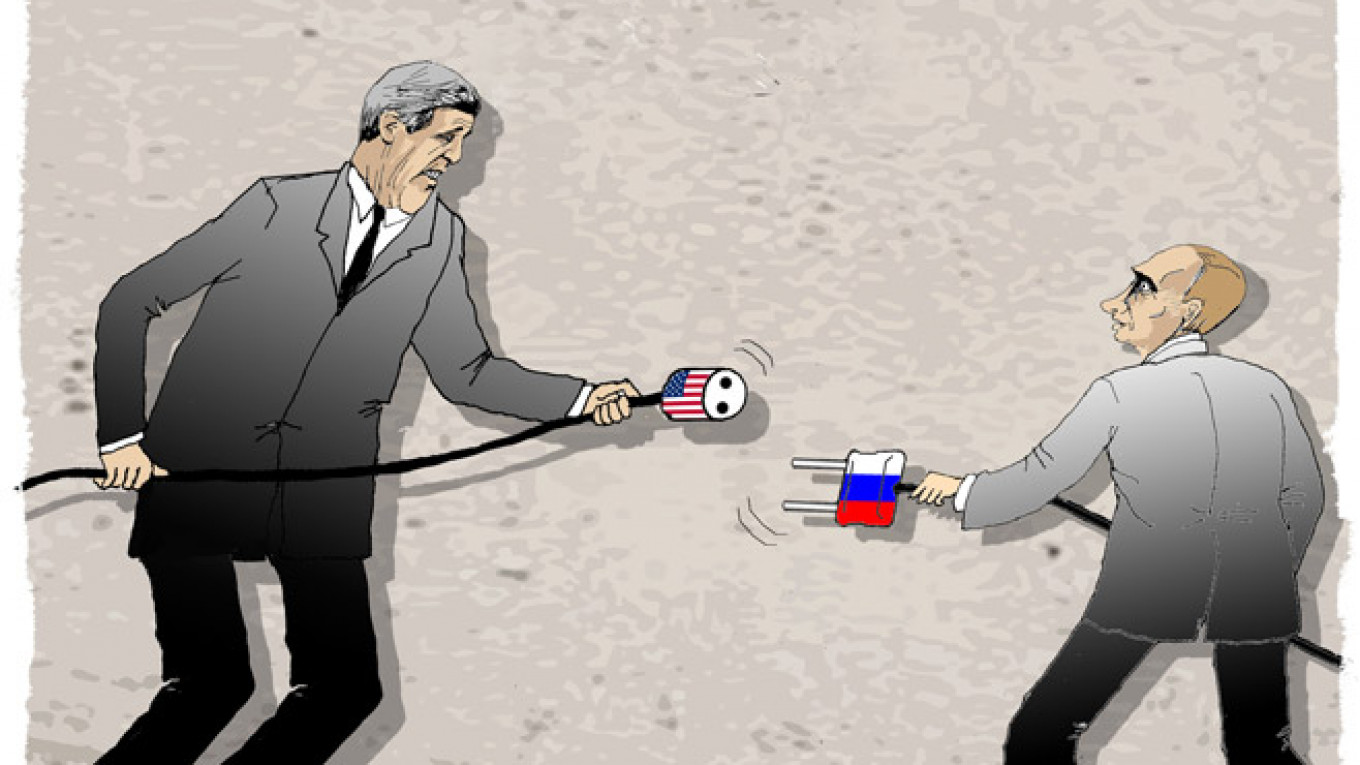U.S. Secretary of State John Kerry's recent trip to Sochi to meet with President Vladimir Putin, the first noteworthy Russian-American diplomatic exchange in the better part of a year, was not exactly a productive trip.
After the meeting, Russia and the United States were every bit as much at loggerheads as they were before. NATO expansion, the war in Ukraine, European energy security, ballistic missile defense, the fate of Syrian President Bashar Assad: there was no shortage of issues on which Washington and Moscow continued to occupy diametrically opposed positions.
Putin and Kerry reached no kind of "grand compromise." They couldn't even credibly claim to have made meaningful progress on one of the more specific, technical areas in which the United States and Russia have continued (in an extremely limited and very narrow way) to cooperate.
The purpose of the meeting, rather, was to demonstrate a modicum of good faith. By meeting in person, Kerry and Putin were able to show their respective governments and the rest of the world that the lines of communication between the two sides, which had broken down almost entirely over the past year as Russia more and more blatantly intervened in Ukraine, were once again open.
That might sound as if it is damning with faint praise, but there is real value to what Kerry and Putin did. To put it a bit dramatically, as long as words are flying back and forth between the Russian and American governments, it is likely that ballistic missiles won't.
The chance of war between the two countries has (thankfully) remained extremely remote even as the standoff over Ukraine has escalated, but this possibility was marginally less remote than it was just a year or two ago. Having the two governments speak, even if the contents of this speech are meaningless, costs nothing and helps make the world just the slightest bit less dangerous.
Nonetheless, despite the apparent banality of the Putin-Kerry chat, some people managed to find fault with it. Leon Aron of the American Enterprise Institute and David Kramer of the McCain Institute for International Leadership both wrote angry editorials in which they denounced Kerry for his trip to Sochi in extremely harsh terms.
Neither Aron nor Kramer expressed displeasure with the specifics of a deal that Kerry struck. The reason for this is exceedingly simple: there was no deal to criticize.
Kerry didn't offer the Russians anything. He didn't offer to soften the sanctions that are slowly strangling the Russian banking system, he didn't offer any modifications of the European missile defense system that the Russians have always found objectionable, and he didn't offer to change America's position regarding Ukraine. There was no betrayal of any previously stated American policy position.
Both Kramer and Aron were angry with Kerry for the mere act of speaking with Putin. Indeed, both editorials make very similar arguments that by meeting with Putin Kerry was affording him a legitimacy that he doesn't "deserve." Statecraft doesn't revolve around abstract notions of fairness or justice — statecraft, ultimately, is based on reality.
You can hate Vladimir Putin with all the passion a human being can muster. You can compare his malice and mendacity to Stalin, Hitler or Mao. But that hatred, regardless of its intensity or eloquence, does not change the simple, unalterable fact, that Putin is the president of the Russian Federation and will remain so for the foreseeable future.
Not talking to him, and pretending to exist in an alternate universe in which he is not president of Russia, is ultimately an exercise in pure wishful thinking.
In saying that we ought to talk to the Russians I am not suggesting any specific content of that speech. You can be in favor of talking to the Russian government and also in favor of an extremely hawkish policy of NATO enlargement and ballistic missile defense. One has nothing to do with the other.
People of good faith have any number of different views on the appropriate contours of U.S. policy regarding Russia, and they can and should argue about what this policy should look like. But simply talking to the Russian government is not, as both Kramer and Aron suggest, doing it any kind of special favor or bestowing it with some kind of "undeserved" status.
It is actually the precise opposite of that, treating Russia in exactly that same manner that the United States treats virtually every other country in the world.
Diplomacy is not a synonym for weakness and conducting negotiations is not a "favor" that needs to be balanced out. Even if, in the absolute worst case, it is simply to trade insults, it is in all of our self-interest that more meetings like Kerry's take place.
Maintaining an open line of communication doesn't, by itself, have any impact on policy, but it does help both sides to avoid miscalculations about the other's intentions. Given the stakes of those potential miscalculations (thermonuclear war) we should be willing pay a pretty hefty price, and we should certainly be willing to pay the nonexistent cost of talk.
Mark Adomanis is an MA/MBA candidate at the University of Pennsylvania's Lauder Institute.
A Message from The Moscow Times:
Dear readers,
We are facing unprecedented challenges. Russia's Prosecutor General's Office has designated The Moscow Times as an "undesirable" organization, criminalizing our work and putting our staff at risk of prosecution. This follows our earlier unjust labeling as a "foreign agent."
These actions are direct attempts to silence independent journalism in Russia. The authorities claim our work "discredits the decisions of the Russian leadership." We see things differently: we strive to provide accurate, unbiased reporting on Russia.
We, the journalists of The Moscow Times, refuse to be silenced. But to continue our work, we need your help.
Your support, no matter how small, makes a world of difference. If you can, please support us monthly starting from just $2. It's quick to set up, and every contribution makes a significant impact.
By supporting The Moscow Times, you're defending open, independent journalism in the face of repression. Thank you for standing with us.
Remind me later.






